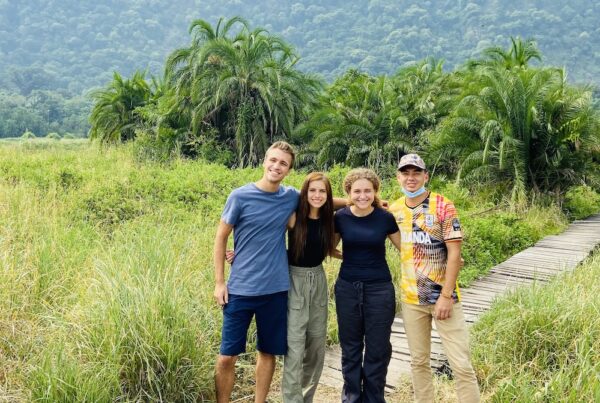I was sitting in a hot cement office in Burundi, a small country in Central Africa, with a single fan next to me doing what it could to stir up the air. That is – whenever the power was on.
I was in the capital of Burundi, Bujumbura, at Hope Africa University (HAU), talking about a potential role in their business department.
As I tried to get a feel for the place, I inquired about all kinds of things: students, programs, the involvement of the church, faith integration in the courses, and lots more.
But when I asked about the faculty — specifically how many of the business instructors held a Ph.D. – the response was “none.”
Not only that, but the Vice President for Academics was pretty sure that there were only two people in the country with a Ph.D. in business.
There were a few with PhDs in statistics and economics that helped out in the business department — but no doctoral business degrees in the business department.
That hit me hard.
In my business school in France, there must have been at least 20 people with PhDs on one floor, in one building, at one school, in one city of that country.
But Burundi had two.
Why Teach in Africa if you have a Ph.D.?
For those of you who completed what seems like a lifetime of education and training, why give up a career you’ve spent perhaps a decade training for before you even get a chance to start it?
Why walk away from tenure?
Why leave when you’re going to be up for partner at your firm?
Why mess up this good thing that you have going?
The deal-maker for my wife and I was this thought:
If I don’t take a teaching role at a university in North America, can they find someone else to take that position?
Yes, they can find someone just as good, likely better.
If I don’t take this role in Burundi at the University, will they find someone else?
Will that Christian institution of higher learning be able to pick from a list of applicants? Will those MBA students have someone else to teach them?
To me, the answer did not make us feel like we had to go, or that we were trapped, or that it’s something I really ought, should, or must do. But it made it clear that it’s what we could do, and was what we want to do, what we get to do.
If the phrase “blessed to be a blessing” (which we inherited from Abraham in Genesis 12) really means something to us, what will that look like?
If we are going to take seriously Jesus’ statements about action and not just words towards those that He spoke so frequently of—widows, orphans, the poor—what does that look like for someone with advanced education?
For us, the clear answer was going to serve alongside those who are trying to solve problems now, while also raising up a generation hopefully better equipped to do so in the future.
Clearly work in the developing world is not the only way these kinds of skills can be used in the service of God and others. Yet, I am grateful for this way to live out my faith convictions.
Merely three years ago, serving in this kind of role, in this kind of situation, was not even really on our radar. But now, I can’t imagine doing anything else.
But how does it work to use your education in this unconventional way?
Many times when we speak of the role of education in development, we speak of how training nationals is one of the best ways forward, and this is absolutely true.
However, this training can only happen if someone is qualified to offer that education.
Education is key.
To solve all kinds of problems the solution needs to combine two things: an understanding of the true nature of the problem, and knowledge and skill to provide an appropriate response.
Often this happens when we combine someone who knows the problems and situation best, with someone who has some of the knowledge and skills to create a response.
Since higher education is so much easier to access in the West, many of us have benefited from the privilege of being trained and mentored. We have conducted research and gained experience so we now have some of the knowledge and skills to respond to certain problems.
However, we have a massive lack of understanding of the particular problems in context—especially the true causes behind the visible problems.
Culture, language, and other barriers mean that I won’t—and never will—understand the problems of Burundi like Burundians do.
However, in many places including Burundi, those who understand the situation the best, have had severely limited access to training and education. Somehow these two pieces—required for any decent solution—must come together.
A Vital Combination for Success
First, we can come and serve alongside local partners. Physicians who ensure safe deliveries for both mother and child, academic administrators helping to direct fledging institutions, engineers who oversee construction—we do those things that we have been trained to do together with our local colleagues.
This is not insignificant.
In the case of Serge missionaries in Burundi, working together with our key local partners—Hope Africa University and Kibuye Hope Hospital—our teams can have a significant impact on helping others to accomplish what they want to do.
These partnerships develop over years and become very fruitful as we gain a deeper understanding of local culture, develop trust, and transfer skills. All of this provides the two parts necessary:
Understanding of the true problem AND The knowledge and skills to address the problem.
As a long-term vision, this leads to the multiplication that only comes through education.
A single physician can only treat so many patients — however if he or she assists in the training of new doctors the impact can be literally hundreds of times greater.
My training of MBA students gives the opportunity for them to become entrepreneurs, managers, and others who combine their faith with knowledge and skills to create employment, drive development, and create small businesses that respond to the needs of their country.
This does not mean that those of us with advanced training merely show up to tell others how everything should be done. We need to listen and learn from those who understand the true nature of the problem.
And for a Ph.D., this can be the opportunity of a lifetime, because the best teachers are learners.
>> Learn more about how you can use your education and skills to serve urgent needs or begin a conversation with us about a custom opportunity.






